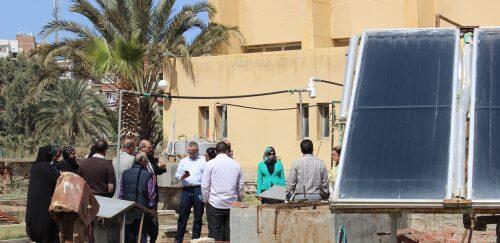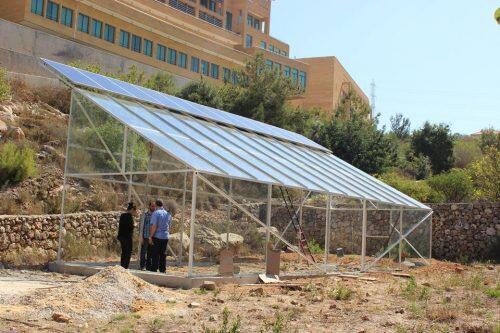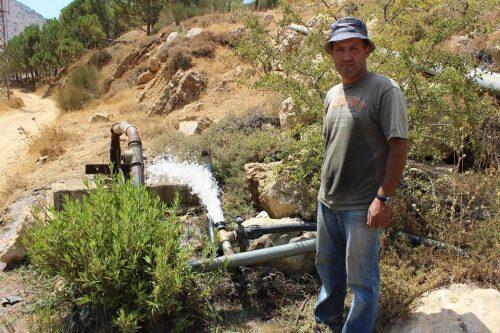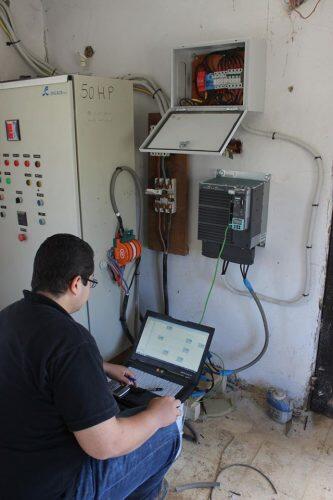Renewable energy is not an insignificant topic today as it was in previous years. This type of energy is essential for the environment, and for the human health. It contributes to the reduction of greenhouse gas emissions in the atmosphere, mitigating at the same time the effects of climate change. A European Multilateral Cross-Border Cooperation Program (GR.ENE.CO) was organized in this regard, financed under the 2007/2013 ENPI CBC MED.
A European Multilateral Cross-Border Cooperation Programme, by GR.ENE.CO, which stems from the need to improve the energy efficiency in the Mediterranean area by spreading the use of renewable energies as main power source, particularly at the farm level, was finalized in a conference to present the results achieved on April 14th at the Riviera Hotel- Beirut. It continued on the 15th of April at Mresti – Mount Lebanon – Chouf with the inauguration of the pilot site. “greenarea.info” attended the closing ceremony, in which two Lebanese companies were awarded the best green farms.
Reporter: Zeina Nasser
Videographer and Video Editor: Ahmad Farhat
Project and Objectives
According to the organizers, the promotion of REs production and consumption (solar, wind, biomass, and hydropower) and the improvement of energy efficiency at the level of productive activities, in particular crop production, may greatly contribute to reduce greenhouse effect emissions following Kyoto commitments, and to mitigate the effects of climate changes.
This way, people will not be dependent on limited resources anymore, reducing social and political troubles connected to the continued reliance on conventional energy sources. To this purpose, GR.ENE.CO offers several tools for supporting local farmers from Sardinia, Egypt and Lebanon in the adoption of RES as usual power sources.
Study Visit to Egypt.
The organizers also mention on their website that “Due to the spreading of the RES plants use and by ensuring the energy self-sufficiency, GR.ENE.CO contributes to strengthen SMEs innovation capacities, knowledge management and networking. This will lead to a reduction in the emissions of some noxious gases, thus leading to a healthier environment”.
They add that “At the same time, it clearly contributes to promote and reinforce the European and Mediterranean dimension of renewable energies by facilitating cross border comparisons and cohesion so as to best work together to confront the critical challenges in the issues of energy, climate and environment protection. It is an important bridge between both Northern and Southern sides of the Mediterranean Sea, contributing to the know-how, technologies and best practices transfer other than and supporting local farmers in the adoption of RES as usual power sources”.
The activities that the program included were:
- Research & Energy planning: analysis of RES available to match it with local energy needs and then elaborate an energy development plan to be further implemented.
- Pilot projects: Private and public experimental interventions by implementing green energy infrastructures and plants.
- Increasing awareness and capitalization: training activities to promote and raise awareness on REs, energy and environmental saving at local level including workshops, training courses and seminars.
- Mediterranean REs Tools: REs funding tools to stimulate and give financial support to farms for settling pilot RES plants and expertise, techniques and REs methodologies sharing instruments among farms belonging to the project area.
- GR.ENE.CO Network: operational channel made of public and private organizations for strengthening and prosecuting the overall action.
Pilot Plant in Lebanon.
In general, GR.ENE.CO wants to be a valid instrument of spreading the local public consciousness on RES benefits from one country to the others, in particular local farmers’ awareness in order to embed sustainable behavior in their crop system as well as their lifestyles. Through the proposed activities, GR.ENE.CO aimed to develop business skills in the field of technological innovation and energy saving for the advancement of knowledge about REs and increasing its utilization.
GR.ENE.CO announces that “As a long-term result, conscious of its benefits, not only the farms involved in the pilot project will increase but also the number of farms willing to adopt a green plant”.
Visit to Egyptian and Lebanese farms
Part of the project included that GR.ENE.CO delegation made of partner representatives (Alexandria University and Ministry of Agriculture of the Republic of Lebanon) and farmers from Egypt and Lebanon visited Egyptian companies specialized in renewable energies production. Then the delegation visited farms in Lebanon from 22 to 28 of March.
From the visits to Farms in Lebanon.
The delegation of Egyptian farmers and Alexandria University representatives has visited several Lebanese farms in the Bekaa Valley last 21 and 22 of March 2016: Tarchichi Farm, Ardona Cooperative in Baalbeck (fodder production), Saker Farm in Deir El Ahmar (vegetables and cereals production), Makneh Farm (fruit trees). The visit has been organized by the Ministry of the Agriculture of the Republic of Lebanon. The delegation successfully managed the best practice exchange, contributing to the achievement of project objectives and results, GR.ENE.CO announced.
“greenarea.info” interviewed the coordinator of the project from University of Alexandria, Egypt, Mr. Kassem, who said that “Alexandria University was a partner with Beirut Arab University and the Ministry of Agriculture”, adding that “they concentrated on “raising awareness on renewable energy in Egypt in Alexandria and Biheira by training 30 engineers and more than 1000 students through workshops”. They also trained several farmers and offered a grant for some of the farmers to build solar systems in order to become a success story people can imitate after the end of the project. He also mentioned the study visits from Egypt to Lebanon, and the free consultation and support from Alexandria University for anyone who would like to build solar systems.
The delegation of Lebanese farmers and Beirut Arab University and MOA representatives have visited several Egyptian green farms in the Burg AlArab, Abees, Bakoos and Wdi El-Natroon Area last 9-13 March 2016. The visit has been organized by Alexandria University. The delegation successfully manages the best practice exchange, contributing to the achievement of project objectives and results.
Mrs. Majida Mcheik from the Lebanese Ministry of agriculture, who talked about the project’s achievements in Lebanon, also told “greenarea.info” that “the Lebanese center for Energy Conservation (LCEC) chose the 2 winners, taking into consideration the quantity of energy used in the land, and the surface of cultivation”, adding that “the first farmer planted cereal crops, and produced 700 Mkw of energy, and the other farmer was chosen for his fruit trees, and for producing 110 KW of energy”.
Dr. Hadi Abou Chakra from BAU discussed in an interview with “greenare.me” the ways that the University assisted in the project.
We hope that the two Lebanese farmers will become a success story for more farmers to adopt green solutions.
Follow us on our Twitter account @greenareaen















